Israeli airstrikes hit Iran's alleged Syria-Lebanon arms route
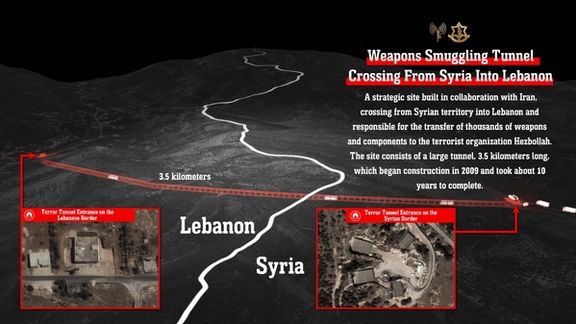
The Israeli military launched its latest airstrike on the Syria-Lebanon border on Monday targeting what it described as Iranian smuggling routes used by Hezbollah.

The Israeli military launched its latest airstrike on the Syria-Lebanon border on Monday targeting what it described as Iranian smuggling routes used by Hezbollah.
The Israeli military posted to X that a series of airstrikes over an unspecified time period attacked the route Iran has been using to supply Hezbollah’s elite unit 4400 with weapons with the oversight of Syria's Military Security.

The route is allegedly used for storing weapons in Syrian military warehouses prior to their transfer to Lebanon.
The Syrian Military Security Unit plays a key role in supplying weapons to Iran's proxies in the region, the Israel Defense Forces (IDF) said, adding that the strikes come as part of efforts against Hezbollah’s Unit 4400, which is the body responsible for transporting weapons from Iran and other regional allies to Hezbollah in Lebanon.
It was headed by Muhammad Ja’far Qasir, who was wanted by the US State Department before Israel assassinated him on October 1, 2024.
“The IDF remains committed to countering Iran’s efforts to arm its terrorist proxies across the region,” the tweet read.
They posted an animated video to the tweet that shows the alleged Iranian smuggling route that starts in Iran, makes its way into Iraq and through Syria into Lebanon.
The Israeli military said in its statement that the Iranian smuggling routes are not a new target but part of a long-term effort to disrupt the flow of weapons to Iran's armed allies which have been confronting the Jewish state for over a year.
Syria’s state news agency SANA said the Israeli strikes on Monday damaged bridges in the al-Qusayr area.
According to the Syrian Observatory for Human Rights, two people were killed and five injured in that attack.
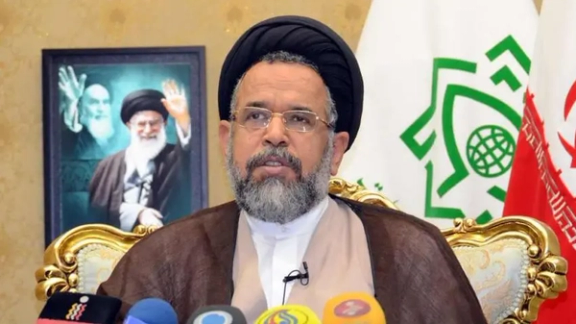
A former Iranian minister of intelligence said that investigators have been unable to identify the perpetrators or methods behind the assassinations of several nuclear scientists, underscoring the country's intelligence gap with likely perpetrator Israel.
The remarks were among the most critical yet by a current or former top official on Iran's intelligence capabilities vis-a-vis a top national security dossier.
“In the assassinations of the four nuclear scientists ... we were unable to identify those who committed the crimes," Mahmoud Alavi was quoted as saying by Iranian media outlets. "Nor were we able to thoroughly study the methods of their assassinations."
He was referring to slain nuclear scientists Masoud Ali-Mohammadi, Majid Shahriari, Darioush Rezaeinejad and Mostafa Ahmadi Roshan.
"However, the case of (Mohsen) Fakhrizadeh was different. Everyone was identified. Nevertheless, we faced a vigilant enemy who, typically, would flee just half an hour before we could reach them,” added Alavi, a minister during Hassan Rouhani’s presidency.
Between 2010 and 2020, the five Iranian nuclear scientists were assassinated by various means but none of the killers have been apprehended.
Ali-Mohammadi was killed by a remote-control bomb attached to a motorcycle in Tehran on January 2010.
Shahriari and Ahmadi Roshan died when explosives attached to their vehicles detonated in attacks in 2010 and 2012. Rezaeinejad was shot and killed by motorcycle gunmen in Tehran in the summer of 2011.
Fakhrizadeh, an Islamic Revolutionary Guard Corps commander regarded as the chief of Iran's nuclear program, was shot dead by a remote-control machine gun in Damavand near Tehran in 2020.
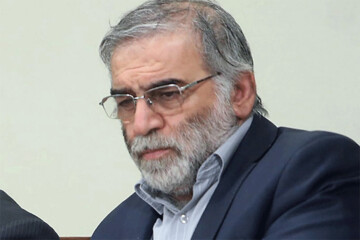
His comments cast doubt on the government’s earlier claims of cracking down on foreign espionage.
In 2012, the Islamic Republic executed Majid Jamali Fashi, accusing him of assassinating Alimohammadi. The conviction was based on video-taped confessions aired in a state-produced documentary called The Terror Club.
The program featured 13 individuals allegedly trained in Israel for espionage and sabotage, many of whom later recanted their confessions.
Maziar Ebrahimi, another person featured in film, described later how he was tortured into falsely confessing a leadership role in the team that killed Shahriari.
Released years later, Ebrahimi has since publicly denounced the confessions, accusing Iranian authorities of fabricating the charges. Now residing in Germany, he described systemic flaws in Iran’s judicial and intelligence processes during an interview with BBC Persian in 2019.
A spokesperson for Rouhani’s government Ali Rabiei distanced the administration from Ebrahimi’s case, saying it did not occur during their administration.
Rabiei conceded that some confessions were unreliable and improperly assessed, pointing to non-specialists’ involvement in critical counterintelligence investigations.
Unresolved case of Mohsen Fakhrizadeh
Fakhrizadeh, Iran’s leading nuclear scientist and a pivotal figure in its nuclear program, was assassinated on November 27, 2020, near Absard east of Tehran. Alavi said intelligence services identified the suspects’ movements but they repeatedly evaded capture.
“We tracked them to various cities—Arak, Hamedan, Sanandaj, and finally Saqqez—but ultimately lost them as they left the country,” he said.
International media reports described the assassination as an operation involving a remote-controlled weapon smuggled into Iran. The weapon was designed in Israel and assembled inside Iran and was part of an eight-month operation orchestrated by a 20-member team of Israeli and Iranian nationals, the Jewish Chronicle reported.
Espionage accusations
Iranian authorities have since announced arrests and indictments, but inconsistencies persist. Initial claims suggested five to six armed individuals were involved, while later reports cited indictments against 14 suspects.
Human rights organizations have identified several Kurdish detainees accused of assisting the operation and raised questions about the transparency and fairness of the investigations.
Despite sporadic arrests and indictments, Iran’s intelligence services have struggled to conclusively address these high-profile assassinations.
Judiciary spokesperson Asghar Jahangir recently announced the identification of eight individuals accused of spying for Israel, with three sentenced to death.
However, rights groups like Kurdistan Human Rights Network argue that these suspects were denied due process, including access to independent legal counsel during critical investigative stages.
The recurring failures to secure accountability may reflect broader systemic shortcomings in Iran’s security apparatus.
While officials have attributed the assassinations to Israeli operatives, some critics have pointed to internal weaknesses including flawed intelligence practices and politicized judicial procedures as contributing factors.
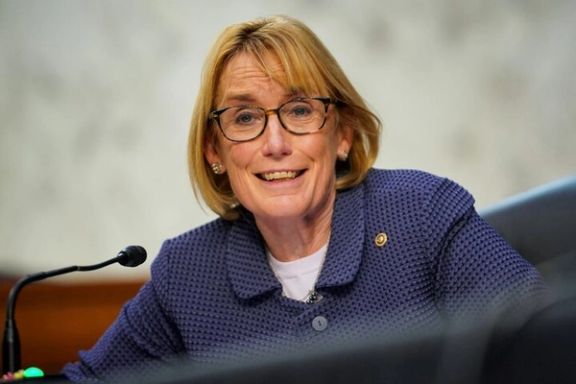
New bipartisan legislation aimed at increasing the penalties for crimes committed by foreign adversaries targets Iran’s government and the hired criminals it allegedly employs to kill opponents on American soil.
The Deterrence Act is a response to Iran’s plot to kill President elect-Donald Trump and other Iran-led murder-for-hire attempts which US investigators have described in lengthy criminal complaints in recent months.
The bill increases criminal penalties for those who commit or attempt certain crimes on behalf of foreign adversaries, which already come with increased prison sentences.
“Foreign adversaries like Iran are working with criminal organizations in the United States to kill people on American soil,” co-sponsor Senator Maggie Hassan, a Democrat from New Hampshire, said in a statement.
Hassan added she would work with colleagues to pass this legislation as quickly as possible to send a message to Iran's rulers.
Earlier this month, the Department of Justice (DOJ) disclosed an Iranian-led plot to assassinate Donald Trump, charging a man they said had been tasked by the Islamic Revolutionary Guard Corps to kill the Republican candidate on the campaign trail.
Farhad Shakeri, an Afghan national was identified by the FBI as an Iranian government asset who moved to America as a young child but was deported after being imprisoned on robbery charges. He allegedly hired individuals he met while in prison for the alleged plots, according to a criminal complaint unsealed in federal court in Manhattan.
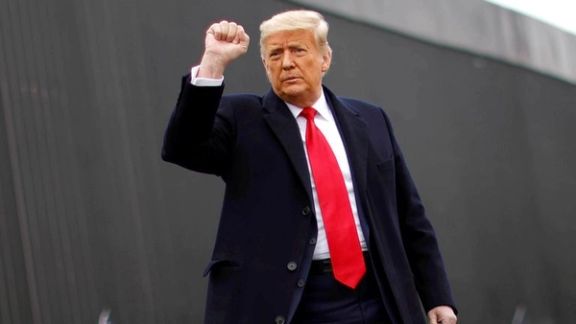
Two other men were arrested on charges that Shakeri recruited them to surveil and kill prominent Iranian- American human rights activist and journalist Masih Alinejad. According to US law enforcement, Alinejad has been the victim of several Iranian murder-for-hire plots thwarted by the FBI on US soil.
Another co-sponsor, Iowa Republican Joni Ernst, said Iran has enjoyed years of “appeasement.”
“Now that the regime has become so emboldened that it even attempted to assassinate President Trump, Senator Hassan and I are taking action to ensure any bad actor thinks twice before working with our adversaries or messing with any of our citizens,” Ernst said in a statement.
Florida Democrat Representative Moskowitz, another co-sponsor who is part of a bipartisan task force investigating the assassination attempts against Donald Trump, said he is deeply disturbed by Iran's reported active attempts at targeting Americans on US soil.
“We need to send a message that any person who works with a foreign government, especially a state sponsor of terrorism like Iran, will face severe consequences for harming Americans,” he said in a statement.
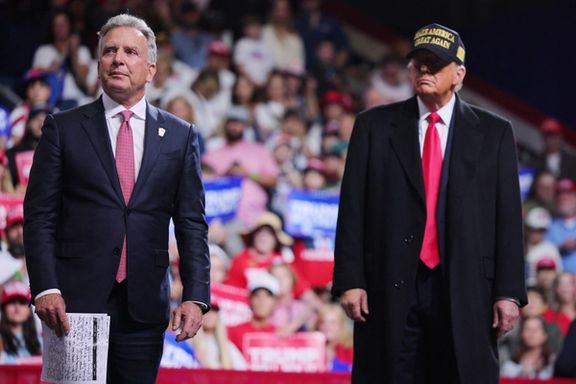
As President-elect Donald Trump completes his top cabinet picks, it is another face from the business world who will step into the role of Middle East envoy: property mogul Steve Witkoff.
For Trump’s second term, Witkoff will step into the shoes of Trump’s son-in-law Jared Kushner who had the role the first time round.
Instead of using veteran diplomats for the region - which is currently struggling through its most violent conflict in decades - Trump has signaled that, when it comes to his top personnel, it's back business.
Money talks
Witkoff is cut from the same cloth as Trump: a New Yorker who made his fortune in the city, it is likely he will take a similar approach to his predecessor as Trump lines up his priorities.
Next for Trump will be securing a peace deal between Saudi Arabia and Israel and expanding his historic 2020 Abraham Accords which saw Israel normalize ties with several Arab countries including the United Arab Emirates.
In spite of his lack of diplomatic experience, Kushner was key to the deal, suggesting Trump sees the same potential in Witkoff, who will no doubt be working hard to learn from Kushner as he readies for the role.
Witkoff, 67, is “smart, personable and a talented negotiator with a common touch”, the Wall Street Journal cited peers as describing him, which will be critical as US-brokered peace talks continue between Israel and Hamas in Gaza and Iran-backed Hezbollah in Lebanon.
Though Jewish and a vocal supporter of Israel, Witkoff, like Trump, is serious about business. Just last year, he sold Manhattan’s Park Lane Hotel to the Qatari Investment Authority, the country’s sovereign-wealth fund, for $623 million.
Old friends
Witkoff and Trump have been friends since 1986. Witkoff was a young attorney at white-shoe law firm Dreyer & Traub when they first met. Since then, Witkoff learnt from his former client and climbed the ranks of the world of real estate.
He has since been a loyal supporter of Trump, not only testifying in his defense at a Manhattan fraud trial but also helping raise huge funds for Trump's campaign through his network of high-net-worth Jewish donors after the Joe Biden administration threatened halting arms exports to Israel in May.
Speaking to The Bulwark podcast, Witkoff reported raising “six-figure and seven-figure donations”. “Every one of my friends started calling and asking, ‘What can I do for Donald Trump?’” he said.
An ardent Israel advocate
Witkoff has been highly complementary about Trump’s policy on Israel. “(His) leadership was good for Israel and the entire region.”
In a post thread on X, Witkoff suggested he will also have eyes on Iran which directly and through its military allies in the region has been in a war of attrition with Israel since the Iran-backed Hamas attack on October 7 last year killed 1,100 Israelis - mostly civilians - and saw 250 hostages taken captive.
Since then, in addition to direct attacks from Tehran, Iran’s allies in Lebanon, Yemen, Iraq and Syria as well as in the West Bank have launched attacks on Israel. Over 40,000 Palestinians have been killed in Israel's campaign in Gaza, local health authorities in Hamas-run enclave say.
“With President Trump, the Middle East experienced historic levels of peace and stability. Strength prevents wars," Witkoff wrote. Iran’s money was cut off which prevented their funding of global terror.”
A man of peace
Trump called his new Middle East envoy “an unrelenting voice for peace” as he prepared to take on one of the most complicated roles in foreign policy.
“Steve is a highly respected leader in business and philanthropy, who has made every project and community he has been involved with stronger and more prosperous,” Trump said.
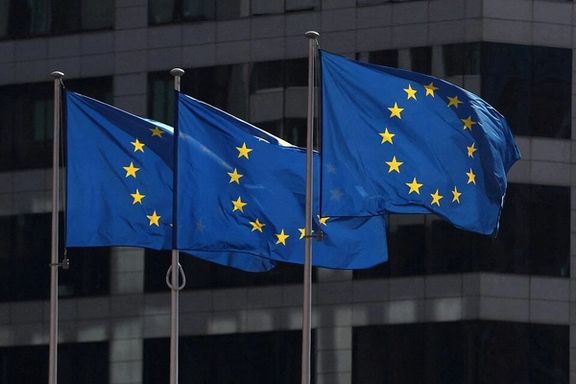
Iran’s state media maintained their optimistic forecasts about talks Tehran says are forthcoming with Europe on November 29, despite the lack of confirmation from the EU or the countries involved.
News websites in Tehran continued heralding talks, as the EU foreign policy officials remained silent, with repeated requests for confirmation by Iran International on Monday remaining unanswered. On Sunday, Iran’s foreign ministry announced that the two sides will meet in Geneva to continue diplomatic efforts for resolving differences.
According to spokesman Esmail Baghaei, the upcoming talks with Germany, France, Britain (E3) and EU officials are seen as a follow-up to meetings held with them on the sidelines of the United Nations General Assembly in New York.
“In this round of talks, which were planned in New York, a range of regional and international issues, including Palestine and Lebanon, as well as nuclear issues, will be discussed.”
Tehran finds itself in a difficult situation as the United States and the E3 sponsored a censure resolution last week at the Board of Governors meeting of the UN watchdog, the International Atomic Energy Agency (IAEA). The resolution condemned Iran’s lack of cooperation with the agency, signaling perhaps more punitive measures in the future.
As pressure on the nuclear dispute ramps up, Tehran also faces the specter of Donald Trump’s return to office and an expected intensification of economic sanctions.
The conservative Farhikhtegan website in Tehran reported on Monday that Iran initiated the request for a meeting with European counterparts, highlighting its eagerness for diplomatic progress ahead of Trump’s return.
At the same time, contradictory signals persisted from Tehran. Hardline politicians continued to demand a move toward production of nuclear weapons in the face of the IAEA censure.
Parliament Speaker Mohammad Bagher Ghalibaf announced on Sunday that Iran has begun deploying advanced centrifuges which enrich uranium for the country’s nuclear program. He said, "The Islamic Republic of Iran's reciprocal response to this political misuse of the Board of Governors was immediately put into action, and the deployment of a set of new and advanced centrifuges has begun".
However, it remains unclear what Iran aims to achieve with the European powers, given that the primary actor is the United States, which will usher in a fundamentally different administration in just two months. Even the Biden administration, which tried to reach an accommodation in 2021 and 2022, has become skeptical of Tehran’s true intentions.
Media in Tehran quoted an Iran-based analyst on Monday as saying, “The Islamic Republic of Iran will not hesitate to engage in direct contact or negotiations with the new US administration if it concludes that doing so benefits the country's national interests.”
The optimistic tone from Iranian media and politicians about the prospects of diplomatic progress may also be an effort to counter the widespread pessimism gripping the country. Since September, the Iranian rial has significantly depreciated, driven by Israeli attacks on Tehran’s proxies, a direct airstrike on Iran, and mounting Western pressure over the nuclear issue. This currency devaluation has exacerbated inflation, which already stands at around 40%, further straining the economy.
However, not all commentators and analysts in Iran echo the official optimism. Some point out that Europe, much like the US has given up on a viable agreement with Iran, partly because of Tehran’s military support for Russia.
Hassan Beheshtipour, a well-known analyst told Rouydad 24 website in Tehran that he believes the European are more inclined to pursue punitive measures, such as resurrecting UN sanctions that were suspended by the 2015 JCPOA nuclear agreement.
"The Europeans prefer to move toward activating the snapback mechanism unless Iran, along with the UK, France, and Germany, changes its approach. If Iran adjusts its stance, a potential agreement might be reached to avoid triggering the snapback mechanism. However, for now, they are strongly pursuing its activation," he argued.
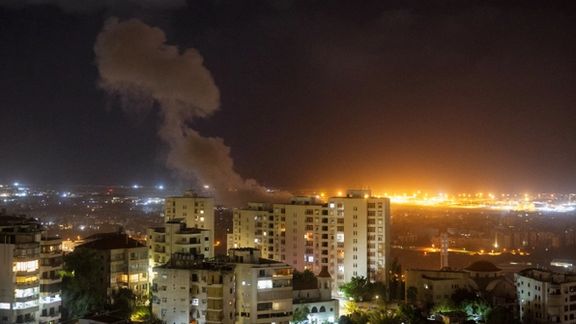
Israel’s ambassador to the United States said that ceasefire talks with Iran-backed Hezbollah in Lebanon are progressing, in spite of the 250 projectiles fired into Israeli territory and continuation of Israeli strikes in Lebanon at full pace on Monday.
"We are close to an agreement, it could happen within days, some corners remain to be closed,” Mike Herzog, Israel's ambassador to the US, told Army Radio on Monday.
The United States believes the two sides have reached a ceasefire agreement, Axios reported on Monday citing a senior U.S. official.
On Sunday night, Israeli Prime Minister Benjamin Netanyahu held closed talks on the matter which would have to be approved by the security cabinet.
The US Undersecretary of Defense for Middle East Affairs, Dan Shapiro, will arrive in Israel on Monday and meet with Defense Minister Israel Katz and other Israeli officials.
A key agenda item will be addressing Israeli concerns its so-called freedom of action and ensuring immediate cooperation on the matter, with Israel insisting on keeping the option for self-defense firmly open.
A senior Israeli negotiator, working closely on the Gaza file, told Iran International: “Each side wants a ceasefire in Lebanon.”
He said that there is no desire to wait until the Trump administration begins in January, as the country is being battered by war, impacting economically and psychologically, while 101 Israeli hostages remain held by Iran-backed Hamas in Gaza and the war rolls on there.
“Bibi fears that the Biden administration may impose sanctions, enforce an arms embargo or even seek retribution against him,” the source said.
“At the same time, he rightly believes that this is a moment when Hezbollah and Iran are at their weakest, Israel not gaining any more by inflicting havoc on Lebanon.”
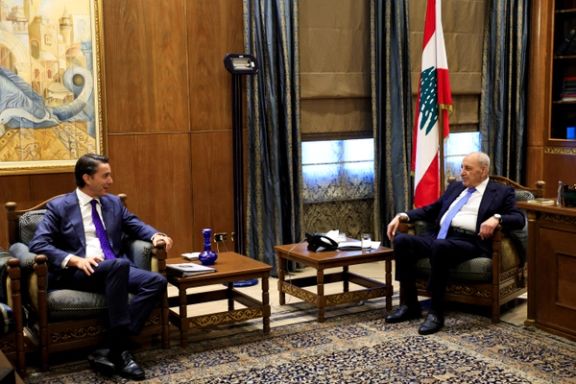
In September, coordinated attacks over two days saw thousands of Hezbollah operatives taken out of action when pagers and walkie-talkies exploded simultaneously.
Soon after, swathes of the group’s leadership, including long-time leader Hassan Nasrallah, were killed in a wave of targeted strikes, which continue today.
Lebanese Parliament Speaker Nabih Berri, a close political ally of Hezbollah, last week said there was progress in the talks, but there were still “technical details” to resolve.
The US-drafted proposal entails an initial 60-day suspension of hostilities during which Hezbollah fighters would move north of the Litani River, about 30 kilometers (19 miles) away from the Israeli border.
However, it would require the Lebanese army to enforce the deal, deploying thousands of troops, which has historically been impossible to impose as Hezbollah continues to defy the army which is essentially weaker than Iran’s largest ally in the region.
Former General Khaled Hmadeh told Iran International that on the ground, the prospects of a ceasefire look more bleak.
"The efforts initiated by Amos Hochstein's recent visits to Beirut and Tel Aviv have yielded little productive outcome, highlighted by the immediate resumption of Israeli reconnaissance flights over Beirut following his departure. The situation further deteriorated with a surge in military operations characterized by escalating violence and destruction after his visit to Tel Aviv," he told Iran International.
He said problems between the US and Iran remain key barriers. "Clear terms that could address the critical issues between Israel and Lebanon remain elusive. Instead, the situation seems to be heading toward further escalation. A significant factor in this deepening rift is Iran's resistance to the changes the United States is implementing in the region, particularly concerning Iranian influence and the status of Iranian-backed armed militias," he added.
Tehran, in turn, he said appears to be "exploiting and capitalizing on its dominance over Hezbollah, and through it, Lebanese political decision-making in the face of US pressure over its regional role and nuclear ambitions".
He said that while Lebanon bears the brunt of the conflict, suffering damage to its political stability, security, and national economy, the effectiveness of the Lebanese government is also under scrutiny, "particularly concerning Parliament Speaker Nabih Berri's navigation of Tehran's influence".
International pressure on Tehran will be key in what not only comes next, but the key to any kind of lasting peace.
"The responsibility to pressure Tehran into dismantling Hezbollah's military capabilities should be recognized as an international and American obligation that transcends purely Lebanese concerns," he added. "Without consistent external support aimed at solidifying the Lebanese Army's role and addressing Hezbollah's military presence, the prospects for stability in the region will remain precarious at best."
A soldier in the elite Golani unit not authorized to speak to media, told Iran International: "I hope we finish them. Lebanon agrees, they also hate Hezbollah."
In spite of being seriously wounded in Lebanon, he longs to go back to the front lines, and "finish the job". "We can't allow them to get strong enough to raise their heads again," he said.
Lior Akerman, a senior fellow and Head of National Resilience Desk in the Institute for Policy and Strategy at Reichman University, said that in the current reality, an agreement with Hezbollah has a wider importance.
It could allow the "return of sanity to the State of Israel", including the cessation of fighting in Gaza, the return of the 63,000 displaced Israeli residents to their homes in the north, the return of the kidnapped in Gaza, and the rebuilding of the state.
The former deputy head of division and a former chief of staff in the Shin Bet told Iran International: "In the distant future, there is no doubt that an all-out war will be required to destroy Hezbollah, but in the meantime, we can be content with keeping them away from the border and giving the Israeli army the opportunity to thwart any security activity against us in the territories of southern Lebanon."
Israel's right-wing national security minister, Itamar Ben-Gvir, urged Netanyahu to reject a ceasefire. On X, he said: "An agreement with Lebanon is a big mistake. A historic missed opportunity to eradicate Hezbollah. I understand all the constraints and reasons, and it is still a grave mistake."
He urged the military to continue to weaken the group, considered terrorists by countries including the US and UK.
"You have to listen to the commanders fighting in the field, listen to the heads of the authorities. Precisely now, when Hezbollah is beaten and longs for a cease-fire, it is forbidden to stop. As I warned before in Gaza, I warn now as well: Mr. Prime Minister - it is not too late to stop this agreement! We must continue until the absolute victory!"
Iran has backed a ceasefire, with Foreign Minister Abbas Araghchi saying last month in Beirut: "We support efforts for a ceasefire on the condition that it would be acceptable to the Lebanese people, acceptable to the resistance, and thirdly, it would be synchronized with a ceasefire in Gaza."